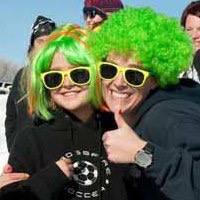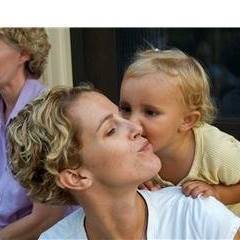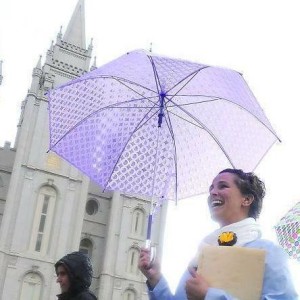Today’s Sunday Spotlight comes from Debra. Through her bravery and faithfulness she helps other women find their voice and continues to focus on the Savior through service and work within her community.
What gives you hope for the future?
Well, when it comes to the Church, the fact that younger women and girls see the inequality and do not accept it. This is also true of many of the younger men I know. I have been pleasantly surprised by the willingness of many, especially younger members, to honestly think about and consider gender inequality and how it can change.
But the thing that gives me hope when it comes to the gospel is that I truly believe in the 9th Article of Faith and the idea that Heavenly Parents will guide this Church if the members prepare themselves and the leaders only ask.
Aside from ordination, what are some changes you would like to see implemented immediately in the Church?
I would love to see young women and girls included more from top to bottom. I’d like to see a more robust Activity Day program and a YW program that focuses on developing well-rounded women who are prepared for this world.
I would love to hear more about Heavenly Mother. Even if it is to say “We don’t know about Her, but isn’t it a beautiful thing that we know She is there?” I long to hear anything about Her.
Tell us more about your connection to Mormonism.
I was raised by divorced parents: a non-member father and inactive mother. My beloved paternal grandparents are devout Catholics; my maternal grandparents are faithful Mormons. My mother’s mother decided, for some reason, that I should go to church with them and be baptized, which she never pushed with my sister. I had no interest until I was a teenager and then I decided I wanted to go to girl’s camp. You can read in my journals that as I moved through my teen years I decided to accept the frequent challenge: I read the Book of Mormon and prayed about it and Joseph Smith. A testimony grew and I could not deny that this was where I found the truth. I recall being drawn especially to the thought of Heavenly Parents and the YW values of Individual Worth and Divine Nature. The idea that these people knew me and made me exactly who I am supposed to be resonated with me—probably because of the experience of growing up a child of divorce—it meant feeling like I was part of a larger family.
What was your favourite calling?
Funnest calling: I was YW president for one year. It was so much fun and so much work. But I L.O.V.E. girls camp!
Best calling: I taught Gospel Doctrine for three years and I am not ashamed to say that I rocked at it. I loved planning the lessons and engaging with adults on gospel topics. My testimony has never been stronger than when I taught that class.
What are some of the things you love about the Church?
The focus on service and community. I find the Saviour in these principles. We are a people who rally around others in need and we are supposed to be a people who welcome and love all who need support. When done right, it is a truly beautiful thing.
What are some examples of gender inequality you see in the Church?
I would not know where to start. I see them everywhere. Just today, I sat outside the clerk’s office and watched the men move around, shuffling paperwork, and realized that I would never be allowed to do that.

How did you discover Ordain Women?
I saw it on Facebook the day it went live. I can’t remember if someone sent me the link or if I saw it on Feminist Mormon Housewives; but I will never forget the post. It simply said, “Have you seen this??”
What prompted you to put up your profile?
OW came along after I had been quietly living with the hope of women’s ordination for more than 20 years. I gave the party line, made little jokes about it, but never seriously advocated because I was terrified that people would realize how much I really wanted it. I had been participating in FMH for 7 years, and had been a vocal supporter of Wear Pants to Church Day.
But the genesis of my participation can be boiled down to a Sunday in March 2010. The hardest day I ever had at church was the day my son was ordained a Deacon. Grandparents, aunts, uncles, and cousins were all there. We entered the bishop’s office and the women—my mother, my husband’s mother, me—were all shunted to the side. My son, for whom I had ironed countless white shirts, was surrounded by men he mostly didn’t know. I had never felt so useless or unnecessary.
This story is also perfect example of the gender inequality I see in the Church. Women are not necessary for anything that happens, other than making new priesthood holders. No women were involved in the interview, the ordination, the training, or the setting apart of my son.
What has been the reaction of your ward/ family/friends?
Most of my family is not LDS so they have been supportive. My friends have been largely supportive. My ward has been a mixed bag. I have lost some people I considered trusted friends.
Have your feelings grown or changed since submitting your profile?
I am more convinced than ever that this is the beginning of a long process required for revelation to be received. We have the responsibility to demonstrate our desire and readiness to receive greater blessings. This is how we do that.

Have you had the opportunity to attend any actions? How did they effect/change you?
I have attended them all. I have been deeply moved by the women and men who have attended. They are sincere and loving and I consider myself lucky to have stood next to them.
I did not realize, nor was I prepared for, how powerful and painful it would be to be denied access to a sacred space in my own faith because of my gender. I have also been deeply disappointed in the reactions of members of the Church to these actions. The messages of hate and vitriol I have received personally following each one have probably been one of the biggest challenges to my testimony.
Do you have any examples of sharing your OW testimony to others?
I hosted an OW Conversation at my house. One dear friend who attended expressed, for the first time that I know of, that she has always wanted to be ordained but that she has also always known that she was not allowed to say that publicly.
How do you see the perception of OW changing with ward members/family/friends?
I have received several private messages from women in my ward who have thanked me for what I am doing. They have expressed hope that they live to see us successful.






